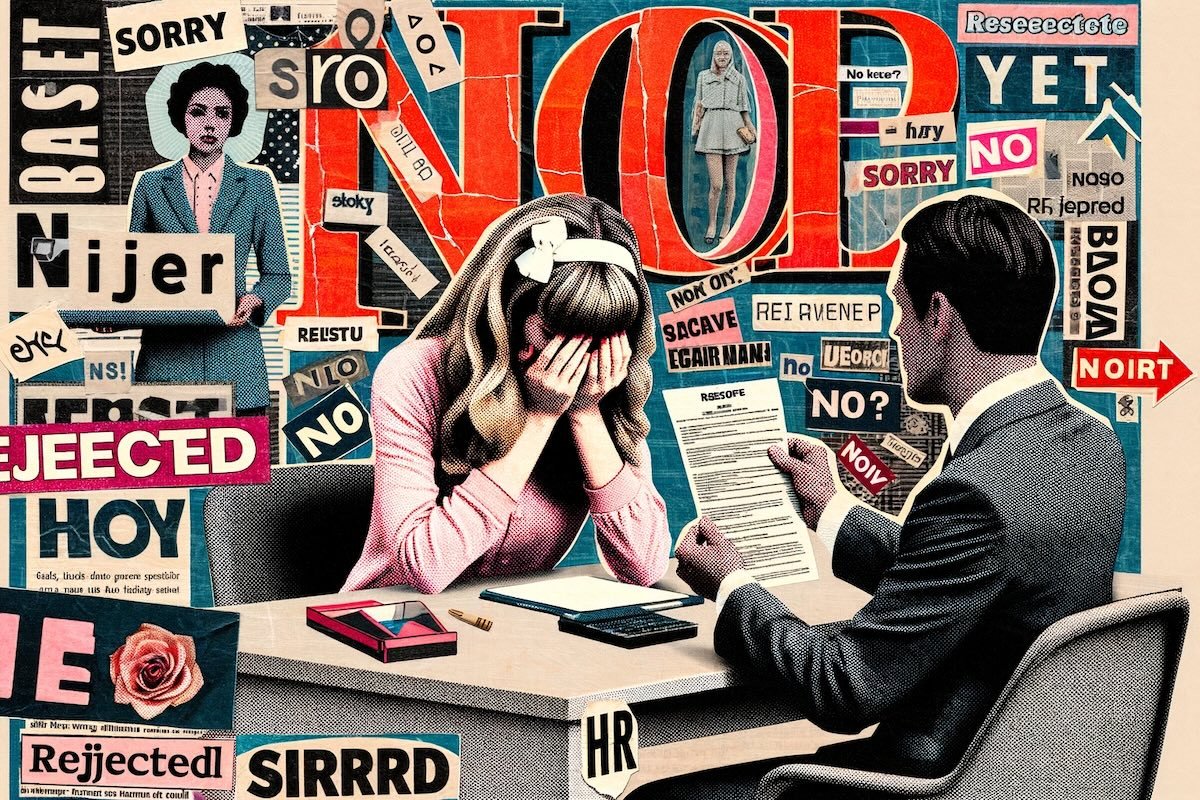You're all familiar with the dreaded cover letter.
Whether you've written one cover letter or over a hundred, it's one of those things that never really gets easier.
Yeah, we said it. And it's true! Cover letters come with a lot of pressure to make a good first impression and show off your personality to a recruiter or hiring manager.
That's why we compiled a list of the most common cover letter-related questions—and we went ahead and answered them (with the help of Leigha May, one of our
career mentors, who also happens to be a life coach and seasoned corporate HR professional. Here's our insight on
all things cover letters.
Your Top Cover Letter Questions, Answered
I'd argue that there are few pieces of everyday writing that are attached with as much anxiety as the cover letter. For something that's just a few paragraphs long, it carries a lot of weight and requires a lot of deliberation and thought.
From formatting confusion to what to do when the company requires a cover letter and you feel you have no experience, we're covering all of your cover letter FAQs.
You don't have to spend all day on Google to get all of your most pressing cover letter questions answered. We did the work for you—and don't worry, the answers aren't too complicated. Let's get into it.
1. Should I Write a Cover Letter?
Let's say you're staring at a job application for a role you're interested in. The job description and application instructions say that the cover letter is "optional."
We know this makes it tempting to just skip writing the cover letter, but here's our advice: write it anyway. We know it's a time commitment. We know it's not fun. We know it can be hard to
nail the tone and voice you're trying to convey. But! Here's the deal.
Your resume is really important, but it only goes so far.
It covers your amazing achievements and work history, but it doesn't offer the opportunity to show some of your personality on paper. This is where the cover letter comes in. In just a few paragraphs, you can essentially bring your resume to life.
Here's another reason it behooves you to write a cover letter, even when it's not required. If you're applying for a new job, you want to create a strong first impression. You want to come across as a go-getter, a person who goes the "extra mile," a person who has enthusiasm for the company and the role.
Writing the cover letter is a way to showcase just how much of a go-getter you are. It makes you come across as hard-working and dependable. It shows—without having to explicitly say it—that you do what it takes to excel.
2. When Do I Write a Cover Letter?
Ideally, you'd write your cover letter at the same time that you submit your resume, so early in the
job application process.
If you've ever gone to submit an application only to see the little asterisk that requires a cover letter to submit, you know it can be draining to pause your application in order to devote time to writing something that stands out.
Our advice? When you're getting
ready to job hunt, make sure you have a general outline for a cover letter on hand. You'll already be working on your application materials like your resume, portfolio, and LinkedIn profile, so add a cover letter outline to the list of items to prepare. Like your resume, you'll want to personalize it based on the role to which you're applying, but it's better to have an outline so that you don't have to start from scratch every time. It's a little more work up front, but it is totally worth the effort.
>3. How Do I Write a Cover Letter?
Here's a breakdown of how to write a cover letter in five simple steps. Put briefly, we recommend that you:
- Introduce yourself in the opening paragraph. (Ideally, your first paragraph should show that you're familiar with the company, quickly explain your background, and lay out your value proposition.)
- In the second paragraph, share what sparked your interest in the company and the position to which you're applying.
- Explain what skills you bring to the table, your accomplishments, your previous work experience, and your qualifications that are relatable to the position. (This is where you'd explain how you'd be a good fit for the role.)
- In your closing paragraph, thank the recruiter or hiring manager for their consideration.
- In the signature, leave your contact information. (Include your first name, last name, email address and phone number so they can easily get in touch.)
4. How Long Should My Cover Letter Be?
Less than a page. Two to four solid paragraphs will do the trick. Any longer and you're making it too much of an effort for a professional to read.
5. How Do I Write a Cover Letter With No Experience?
You're in luck: We wrote an entire article that explains how to write a cover letter for
a position for which you have no experience. The TL;DR is that you likely *do* have experience—it's just a matter of figuring out a way to apply the experience you do have to the role at hand.
For example, if you were president of your school's literary society, you likely have some transferable skills like
leadership and organization, as well as experience like project management or event planning. Think through the experience you have, whether it is from extracurriculars, an internship, a part-time job, volunteer work, etc., and figure out how that experience can apply to the role in which you're interested.
The same rule applies for how to write a cover letter for an internship. You'll want to explain how the experience you've already gained would benefit the position—and lean heavily on how much you'd like to learn from the prospective employer.
6. What Should I Leave Out of My Cover Letter?
In short, leave out anything that doesn't directly pertain to the job—and only provide personal information that is professionally relevant. This is when close-reading the job description comes in handy. Pay attention to what they emphasize and try to mention those items (when applicable, of course), in your cover letter. For example, if it's a management role, you might include an example of your leadership experience in your cover letter.
Additionally, you don't need to disclose anything about your marital status, religious affiliation, or past salaries. In fact, it would actually be
illegal for the hiring manager to ask you about any of these personal aspects. This letter should feel totally professional.
7. Do I Need to Write a Cover Letter For Each Job?
The short answer is yes. The longer answer is that you can create a cover letter template that outlines your employment history, your skills, and your experience. However, you should tailor each cover letter to the job at hand. We think it's easiest to create that template or outline when you're compiling your job application documents. That way, everything is on hand, and the process goes more smoothly.
8. Should I Highlight All of My Skills?
Stick to your top three or four skills—and make sure that they reflect the job description. Remember, the job description is your biggest cheat sheet. Use it to pull important keywords, software proficiencies, and applicable skills. You don't want the cover letter to come across as too "braggy" or that you're simply listing off the skills you saw they wanted in the job description. Think: enough but not too much.
Note that your cover letter and resume give you a chance to show, rather than tell,
some of your strong skills, too. For example, a nicely-designed resume with a strong cover letter showcases your communication skills, without you simply listing "communication skills" on your resume.
9. How Should I Address Switching Industries in My Cover Letter?
Call it out! Recruiters or hiring managers may not immediately see how you may be uniquely qualified or effective if the role you are applying for is significantly different than what you've historically done. Tell your story. The cover letter gives you a unique place to do so, whereas your resume might not.
Let them know that you are intentionally
seeking a shift and note the qualities you bring to the table from your past experiences that are relatable to this new opportunity. It's all about those
transferable skills.
Personally, I enjoy a light-hearted cover letter. Just know that tone isn't always easily translated via the written word and everyone may not have your same sense of humor.
Consider your audience and their company culture. Peruse their website, social media accounts, and LinkedIn profile to get a feel for their vibe. An emerging start-up with a cheeky brand voice is likely to respond well to
a cover letter that reflects their messaging. A more traditional and formal environment may not be as open.
11. How Should I Address a Cover Letter Without Knowing a Hiring Manager's Name?
On LinkedIn postings, you can often see the hiring manager's name as well. If you find a name and know that they're the person who will receive your application, use their name in the salutation. This makes your letter feel more personal and "human." Plus, it shows that you sought out the information on your own accord, which is another feather in your cap.
With that said, don't overthink this one. Many times, especially in larger corporations' job postings, there won't be a name associated with the posting. If you don't know the name of the recruiter or hiring manager yet, no stress. It's totally fine to use a general (but formal!) greeting.
12. How Do I Write a Cover Letter for an Internal Position?
You'll want to follow the rest of our guidance, but you have a bit of a "home field advantage" here. You know
the company culture, and you may have colleagues who let alerted you to the open position that are familiar with you and your work style. All of this works in your favor.
This is your chance to hone in on the ways that your work has made a difference for the company or department so far, expand upon why you feel the role is the appropriate next step for you, explain what you'd do in the role, and name-drop.
Yes, we said it.
If you're looking to move to a different division in your company and someone mentioned your name
as a referral, that's great! Now mention their name. Make sure the hiring manager knows that they're speaking with someone who comes highly recommended.
Use what you already know about the company and the role to your advantage here. One last point: you should definitely personalize your communication in this case. You know the company best. When you're writing your cover letter, no "To Whom It May Concern" or "Dear Hiring Manager" or "Dear Sir or Madam" allowed if you're applying to an internal position.
13. Can I Reach Out on LinkedIn After Sending My Cover Letter?
Absolutely reach out! Use (professional) social media to your advantage here. Potential employers are keen to bring on employees who are passionate about their company and open position.
Reaching out on LinkedIn is a great way to stand out from the other applicants and grab their attention.
14. Can I Paste My Cover Letter in the Body of an Email or Attach it Separately?
We have two answers for this one.
First, think like a recruiter. If you're faced with an inbox full of resumes and cover letters with lots of attachments, it's going to slow down your workflow to open up every. single. one. With that in mind, we think it's nice to place your cover letter directly into the body of your email.
The less clicks it requires and more accessible it is, the more likely it will get read! If you are sending via email, just be sure to personalize it as much as possible so it feels more thoughtful and less like a template.
A caveat: you'll need to read the job application instructions closely. Some of them specify that they'd prefer the cover letter attached, or they may have a form that requires you to upload it in a specific format. If that's the case, use that little paperclip.
If you're using an attached cover letter, we think it looks the most professional when the
formatting matches that of your resume. Let's say you chose a specific font and personalized letterhead for your resume's header. Use the same for the top of the page of your cover letter.
This makes this feel a little "extra"—not in an Elle Woods-scented-paper kind of way, but in "look how detail-oriented I am" kind of way.
And like we mentioned above, you want to keep your cover letter succinct at less than one page of text. Otherwise, you're asking the recruiter or hiring manager to do too much by reading that—plus your resume.
Our other formatting-adjacent tip:
check for correct grammar and read through it over and over (and over!) for typos. We all make grammatical mistakes. But with this communication, the stakes are higher than your standard email. You don't want to come across as unpolished during your first interaction with the prospective employer. If possible, print it out and read it on physical paper. You'd be surprised at how often it's easier to see a typo or mistake that way.
16. Can I Follow Up After Sending My Cover Letter?
If there aren't explicit expectations set in the job posting (i.e., all hiring documents will be in review status for two weeks) then you may follow up. We recommend waiting about five business days.
If the job posting promises that you will hear back after two weeks, then go ahead and set a calendar reminder—and follow up if you haven't heard back by that time. This will show that you paid attention to the job posting and that you're eager and excited about the job, without coming across as overbearing.
BONUS: Even More Cover Letter Resources
Feeling like you're ready to get started writing the perfect cover letter? Need a sample cover letter to get your creativity flowing? In a rush to write a great cover letter, like, yesterday?
If you're looking for even more cover letter resources (or if you're procrastinating so you don't have to start writing your own cover letter), of course, we have you covered. We even have a lot of cover letter examples for your inspiration. Here are our favorite cover letter resources. Now, get to writing!











